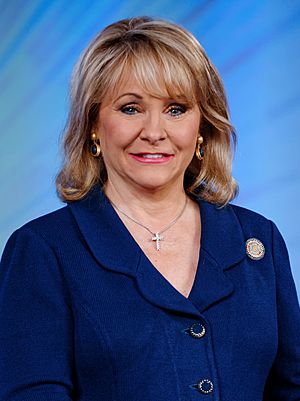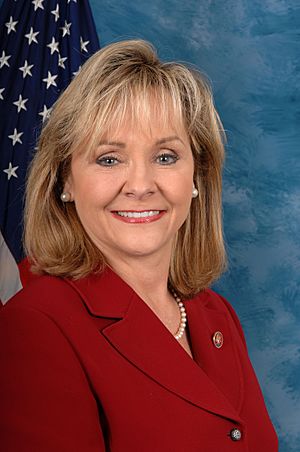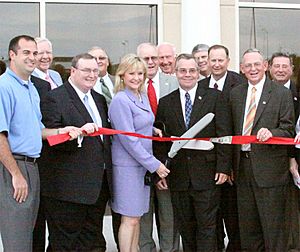Mary Fallin facts for kids
Quick facts for kids
Mary Fallin
|
|
|---|---|

Fallin in 2015
|
|
| 27th Governor of Oklahoma | |
| In office January 10, 2011 – January 14, 2019 |
|
| Lieutenant | Todd Lamb |
| Preceded by | Brad Henry |
| Succeeded by | Kevin Stitt |
| Chairwoman of the National Governors Association | |
| In office August 4, 2013 – July 13, 2014 |
|
| Deputy | John Hickenlooper |
| Preceded by | Jack Markell |
| Succeeded by | John Hickenlooper |
| Member of the U.S. House of Representatives from Oklahoma's 5th district |
|
| In office January 3, 2007 – January 3, 2011 |
|
| Preceded by | Ernie Istook |
| Succeeded by | James Lankford |
| 14th Lieutenant Governor of Oklahoma | |
| In office January 9, 1995 – January 2, 2007 |
|
| Governor | Frank Keating Brad Henry |
| Preceded by | Jack Mildren |
| Succeeded by | Jari Askins |
| Member of the Oklahoma House of Representatives from the 85th district |
|
| In office January 8, 1991 – January 9, 1995 |
|
| Preceded by | Mike Hunter |
| Succeeded by | Odilia Dank |
| Personal details | |
| Born |
Mary Copeland
December 9, 1954 Warrensburg, Missouri, U.S. |
| Political party | Republican (from 1975) |
| Other political affiliations |
Democratic (until 1975) |
| Spouses |
Joseph Fallin
(m. 1984; div. 1998)Wade Christensen
(m. 2009) |
| Children | 3 (with Fallin) 3 stepchildren (with Christensen) |
| Education | Oklahoma Baptist University Oklahoma State University (BS) |
| Signature | |
Mary Newt Fallin (born December 9, 1954) is an American politician. She worked as a real estate broker before becoming a leader in Oklahoma. From 2011 to 2019, she was the 27th Governor of Oklahoma. She was the first and only woman to serve as Oklahoma's governor.
Before becoming governor, Mary Fallin was a member of the Republican Party. She served in the United States House of Representatives for Oklahoma's 5th district from 2007 to 2011. She was also the Lieutenant Governor of Oklahoma from 1995 to 2007.
Mary Fallin started her political career in 1990. She was elected to the Oklahoma House of Representatives. She served two terms, representing a part of Oklahoma City. In 1994, she became the 14th Lieutenant Governor of Oklahoma. She was elected three times and worked under two different governors. After that, she ran for the U.S. House of Representatives and served two terms.
In 2010, Fallin ran for Governor of Oklahoma. She won the Republican primary election. Then, she defeated the Democratic candidate, Jari Askins, in the main election. She won again in 2014. Rules prevented her from running for a third term in 2018. Kevin Stitt was elected to take her place.
Contents
Early Life and Education
Mary Copeland was born in Warrensburg, Missouri. Her parents, Mary Jo and Joseph Newton Copeland, both served as mayor of Tecumseh, Oklahoma, where Mary grew up. Her parents were members of the Oklahoma Democratic Party. Mary was a Democrat until she was 21 years old. Then, she joined the Republican Party of Oklahoma. She also became active with the Young Republicans.
Mary graduated from Tecumseh High School. She went to Oklahoma Baptist University in Shawnee. In 1977, she earned a bachelor of science degree from Oklahoma State University. Her degree was in human and environmental sciences, and family relations and child development. While at Oklahoma State, she joined the Kappa Alpha Theta sorority.
Career Before Governor
After college, Fallin worked for several state agencies in Oklahoma. These included the Department of Tourism and Recreation and the Employment Security Commission. In 1983, she started working in the private sector. She was a hotel manager and later a marketing director for a Ski Lodge in Utah. In Oklahoma, she also worked as a commercial real estate broker.
Oklahoma House of Representatives (1990–1995)
Mary Fallin ran for the 85th district in the Oklahoma House of Representatives in 1990. She won the Republican primary and the general election. In 1992, she was re-elected without anyone running against her.
During her time in the House, she represented Oklahoma City. She wrote 16 bills that became laws. In 1992, she wrote a bill that made it illegal to stalk or harass people. Oklahoma was one of the first states to have such a law. She was recognized as Legislator of the Year in 1993 by the American Legislative Exchange Council (ALEC). She was also named Guardian of Small Business by the National Federation of Independent Business. She worked to protect victims' rights and improve healthcare.
Lieutenant Governor (1995–2007)
After serving in the House, Fallin decided to run for Lieutenant Governor of Oklahoma. She won three elections for this role. In 1994, she won the Republican primary runoff and then the general election against Nance Diamond. She won re-election in 1998 and again in 2002.
In 1995, Mary Fallin became the first woman and first Republican to be Lieutenant Governor of Oklahoma. She held this job for 12 years. As Lieutenant Governor, she served on many state boards and commissions. After the Oklahoma City bombing in 1995, she led a group to help rebuild a childcare center that was destroyed. She also worked to lower costs in the state's workers' compensation system. Fallin supported a program called Project Homesafe. This program gave out free gun locks to help prevent accidental shootings at home.
She also supported a "right-to-work" law. This law makes it illegal for labor unions to require workers to pay union dues to keep their jobs. Oklahoma passed this law in 2001. Mary Fallin was the third longest-serving Lieutenant Governor in Oklahoma history.
U.S. House of Representatives (2007–2011)
In 2006, Fallin decided to run for the Oklahoma's 5th congressional district seat in the U.S. House of Representatives. She won the Republican primary runoff and then the general election. She was re-elected easily in 2008.
Mary Fallin was the first woman elected to Congress from Oklahoma since 1920. She started her term in Congress on January 4, 2007. Her district included Oklahoma, Pottawatomie, and Seminole counties.
In 2007, she passed her first bill, which updated federal grants for women's business centers. During the 2008 financial crisis, she voted for a plan to help the economy. She also worked on issues related to small businesses and energy.
Governor of Oklahoma (2011–2019)
In 2010, Mary Fallin ran for Governor of Oklahoma. She won the Republican nomination. She then defeated the Democratic candidate, Jari Askins. She became the first female governor of Oklahoma.
When Fallin was elected, Republicans won all 11 statewide positions in Oklahoma. This was a first in the state's history.
Economic Policies
Fallin wanted to remove Oklahoma's state income tax. She also wanted to increase sales taxes. In 2016, the state income tax was lowered from 5.25% to 5%. This meant less money for the state.
A big drop in oil and gas prices hurt the state's income. This led to a large budget shortfall. Fallin proposed increasing taxes on services and electronic items. She also suggested raising the cigarette tax.
She signed a law that cut funding to public schools. Some rural schools even went to a four-day school week. In 2016, she signed a law requiring online retailers to collect sales taxes.
In 2017, Fallin tried to expand sales tax to 164 services. These included utility services, cable TV, and legal services. She also proposed removing the state sales tax on groceries.
Gun Laws
In 2014, Fallin vetoed a bill about gun permits. The legislature overrode her veto. In 2015, she vetoed a bill that would have allowed guns in parks.
In 2018, she vetoed a bill that would let adults carry guns without a permit or training. The NRA criticized her for this.
Environmental Views
Fallin was part of a group of governors who opposed federal environmental rules. In 2015, she issued an order against creating an emissions-reduction plan. This was under the Clean Power Plan.
In 2016, she declared October 13 as "Oilfield Prayer Day." She asked people to thank God for the oil and gas industry. She later changed the proclamation to include people of "all faiths."
Local Government Rules
In 2014, Fallin signed a law that stopped cities from setting their own minimum wages. It also prevented them from requiring sick leave. This law was aimed at Oklahoma City.
In 2015, she signed a law that stopped local governments from banning oil and gas drilling. This bill was a response to a city in Texas banning fracking.
Education Changes
In 2014, Fallin signed a bill to stop using the Common Core State Standards. Oklahoma had adopted these standards in 2010.
In 2015, she signed a law that expanded charter schools statewide. Before, they were only allowed in Tulsa and Oklahoma counties. The law required charter schools to be free and open to all students.
In 2018, Fallin made comments about teachers who wanted raises. She compared them to "a teenage kid that wants a better car." She also claimed that some protest groups were involved in a teachers' strike.
Working with Native American Tribes
During her time as governor, Oklahoma had a legal dispute with the Choctaw Nation and Chickasaw Nation. This was about water rights. In 2016, they reached an agreement.
In 2015, Fallin signed a bill for a $25 million bond. This was to complete the Native American Cultural Center and Museum. In 2017, she approved a plan for the Shawnee Tribe to build a casino.
Honors and Awards
Mary Fallin has received many awards. These include the Woman in the News Award and being inducted into the Oklahoma Women's Hall of Fame. She also received the Clarence E. Page Award and was inducted into the Oklahoma Aviation Hall of Fame. She was named Woman of the Year in Government in 1998 and Legislator of the Year in 1993. In 2014, she received the Golden Padlock Award for keeping execution records secret.
Personal Life
Mary Fallin married Joseph Fallin in 1984. They divorced in 1998. In 2009, she married Wade Christensen, a lawyer from Oklahoma City. Together, they have a blended family with six children. One of her daughters, Christina Fallin, is a model, makeup artist, and musician.
Images for kids
-
Rep. Mary Fallin, Keith Ellison, and Jerry McNerney among other congressional delegates meet with Commander of Multi-National Force – Iraq General David Petraeus in 2007
See also
 In Spanish: Mary Fallin para niños
In Spanish: Mary Fallin para niños
- Government of Oklahoma
- List of female governors in the United States
- List of female lieutenant governors in the United States
- Women in the United States House of Representatives
 | Kyle Baker |
 | Joseph Yoakum |
 | Laura Wheeler Waring |
 | Henry Ossawa Tanner |





